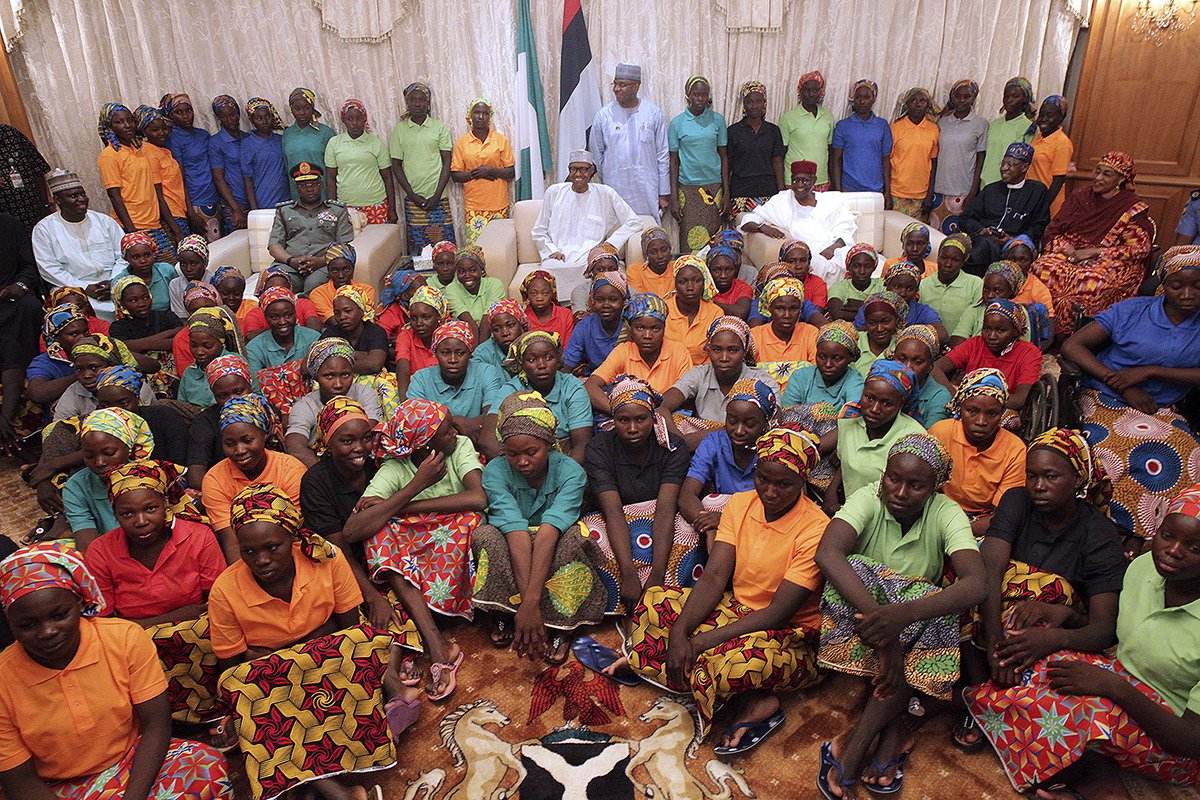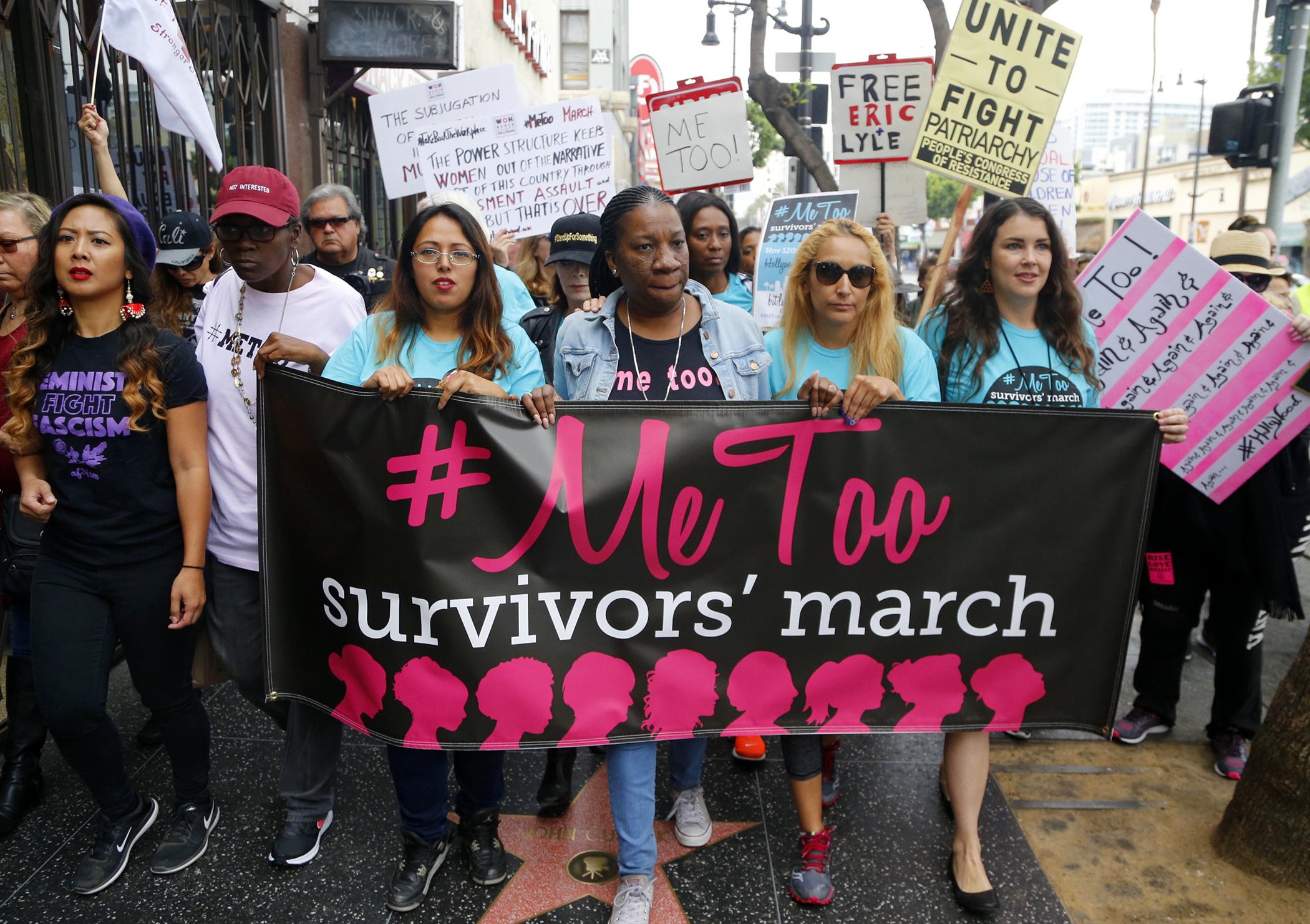It’s been a difficult year, particularly for human rights advocates.
In fact, the United Nations High Commissioner for Human Rights, Zeid Ra’ad Hussein, announced on Wednesday that he will not seek re-election in 2018 after this “arduous year” that has seen “many trends across the world that seem to negate and deny the value of human rights.”
And while there is much work to be done to establish equality and eliminate poverty worldwide, 2017 was not without its wins — especially for women around the world.
Global Citizen is closing out 2017 on a positive note, here are 11 wins for women and girls this year that have given us cause to celebrate.
1/ Women in Saudi Arabia Can Finally Drive
 In this March 29, 2014 file photo, Aziza Yousef drives a car on a highway in Riyadh, Saudi Arabia, as part of a campaign that at the time aimed to defy Saudi Arabia's ban on women driving.
In this March 29, 2014 file photo, Aziza Yousef drives a car on a highway in Riyadh, Saudi Arabia, as part of a campaign that at the time aimed to defy Saudi Arabia's ban on women driving.
In this March 29, 2014 file photo, Aziza Yousef drives a car on a highway in Riyadh, Saudi Arabia, as part of a campaign that at the time aimed to defy Saudi Arabia's ban on women driving.
The government of Saudi Arabia lifted its ban on women driving this year. So starting in 2018, Saudi women will, at last, be able to hit the road. And that’s not all they’ll be able to do in the new year, women will also be able to attend sporting events with their families and girls are now allowed to have physical education and play sports in public schools.
Read more: 6 Euphoric Reactions to The Historic Women's Right to Drive in Saudi Arabia
However, Saudi Arabia’s male guardianship system remains in place, meaning there’s still plenty of work to be done in 2018 and beyond.
2/ We’re a Little Bit Closer to a World Without Child Marriage
 Teenage girls walk in Giridih, India. Giridih district has one of the highest rates of child marriage in India where 6 out of 10 girls are married before 18 years. UNICEF and the Jago Foundation launched a program to make 65 villages child marriage free.
Teenage girls walk in Giridih, India. Giridih district has one of the highest rates of child marriage in India where 6 out of 10 girls are married before 18 years. UNICEF and the Jago Foundation launched a program to make 65 villages child marriage free.
Teenage girls walk in Giridih, India. Giridih district has one of the highest rates of child marriage in India where 6 out of 10 girls are married before 18 years. UNICEF and the Jago Foundation launched a program to make 65 villages ‘child marriage free’ in the district.
Both Malawi and the state of New York outlawed child marriage this year. Malawi raised its minimum age of marriage to 18 in April, while New York acted to end child marriage by raising the official age of marriage consent to 18 — up from 16 with a parent’s permission and 14 with a judge’s approval — in June.
Take Action: Thank you for banning child marriage, Governor Cuomo
The leaders of 27 African countries joined together in October to commit to ending child marriage in West and Central Africa, where 42% of children are married before they turn 18 — the highest rate of any region in the world — according to UNICEF.
And this year, Afghanistan unveiled its “National Action Plan to Eliminate Early and Child Marriage,” a long-term plan to tackle child marriage in the country at its root causes by prioritizing education and addressing cultural norms that encourage the practice.
Despite all this progress, child marriage remains a major issue that disproportionately affects girls. According to the NGO Girls Not Brides, around 15 million girls under the age of 18 are married every year and in total over 700 million women and girls alive today were married as children.
3/ Countries Are Strengthening Laws Protecting Children Against Sexual Violence
India’s Supreme Court closed a legal loophole that lowered the age of consent for girls from 18 to 15 if the girl was married. The court now considers sex with girls under the age of 18 rape, meaning that sex with a child bride is always rape.
After two shocking sexual assault cases involving 11-year-old girls, France is now considering a similar law that would consider sex with a child under the age of either 15 or 13 rape.
4/ Malala Graduated, Joined Twitter, and Started College

Nobel Peace Prize winner Malala Yousafzai celebrated her last day of school and joined Twitter, which she has since used to champion girls’ education. Now a student at Oxford University, Malala continues to be an example for girls around the world.
Read more: Even Malala Was ‘Quite Nervous’ to Start College, New Interview Reveals
5/ We Addressed Period Problems
Scotland became the first country in the world to provide free menstrual hygiene management products like pads and tampons to women and girls in low-income communities.
The US began to follow their lead, mandating that tampons and pads be provided to inmates in federal prisons for free. And the state of California took things one step further by requiring public schools in low-income areas to provide free menstrual hygiene products to students.
Millions of girls miss school when they are menstruating. The World Bank estimates that one in 10 girls in sub-Saharan Africa miss as much as 20% of the school year because of their periods.
Kenya made a major commitment to keeping girls in school this year by vowing to provide “free, sufficient, and quality sanitary towels” to girls, as well as “a safe and environmentally sound” way to dispose of them, according to the BBC.
Often, girls are not able to fully participate in society during their periods because of stigma around menstruation.
Read more: Another Teen Girl in Nepal Dies During Stay in Menstruation Hut
In Nepal, several girls have died because of the practice of “Chhaupadi” in which menstruating girls are isolated, kepts in separate sheds, during their periods. But the government of Nepal banned the practice this year in a move toward combating period taboo.
6/ Dozens of Girls Kidnapped by Boko Haram Were Released
 In this photo released by the Nigeria State House, Nigeria President, Muhammadu Buhari, centre, meets with Chibok school girls recently freed from Nigeria Extremist captivity in Abuja, Nigeria, Sunday, May 7, 2017.
In this photo released by the Nigeria State House, Nigeria President, Muhammadu Buhari, centre, meets with Chibok school girls recently freed from Nigeria Extremist captivity in Abuja, Nigeria, Sunday, May 7, 2017.
In this photo released by the Nigeria State House, Nigeria President, Muhammadu Buhari, centre, meets with Chibok school girls recently freed from Nigeria Extremist captivity in Abuja, Nigeria, Sunday, May 7, 2017. Five Boko Haram commanders were released in exchange for the freedom of 82 Chibok schoolgirls kidnapped by the extremist group three years ago, a Nigerian government official said Sunday, as the girls were expected to meet with the country's president and their families.
After three years as kidnapped captives of the militant group Boko Haram, dozens of Nigerian girls were released or successfully escaped. Many even went back to school this fall.
More than 100 girls are still missing though.
Read more: Report Reveals the Sick Reason Boko Haram Uses Young Girls as Suicide Bombers
7/ Greater Protection for Married Women
Tunisia passed a law in July that makes violence against women in all its forms illegal. The new laws provide greater protection for married women, making it legal for a woman to file a restraining order against her husband for domestic abuse without having to first file for divorce.
The government also overturned a law this year that prohibited Muslim women from marrying outside their faith — women in Tunisia are now free to marry any man of their choosing.
India took steps to protect the rights of married women this year as well, making it illegal for Muslim men in India to divorce their wives by simply saying “talaq, talaq, talaq.”
8/ Several Countries Struck Their ‘Marry the Rapist’ Laws
Both Jordan and Lebanon repealed laws that enabled rapists to avoid severe penalties by marrying their victims.
Read more: Lebanon Closes Legal Loophole Allowing Rapists to Marry Victims
El Salvador overturned a similar law that allowed men to marry underage girls who they had impregnated — including girls who became pregnant as a result of rape — as long as the girls’ parents consented.
Such laws are still on the books in Algeria, Iraq, and Syria.
9/ South Africa Repealed the Statute of Limitations for Sexual Offences
Victims of sexual assault in South Africa previously had 20 years to report crimes, except in the case of rape where the statute of limitations has typically been extended. But in June, the country overturned the statute of limits, making it easier for victims of sexual assault and sexual violence to come forward.
Often, victims of sexual harassment or assault hesitate to come forward for fear of being doubted or ostracized. But 2017 is the year the silence was finally broken.
10/ Women Roared and Were Heard Around the World
 Women with bright pink hats and signs begin to gather early and are set to make their voices heard on the first full day of Donald Trump's presidency, Jan. 21, 2017 in Washington, D.C.
Women with bright pink hats and signs begin to gather early and are set to make their voices heard on the first full day of Donald Trump's presidency, Jan. 21, 2017 in Washington, D.C.
At the beginning of this year, millions of women worldwide marched in support of gender equality. And that momentum carried throughout the year with protests from Venezuela to Israel to Los Angeles.
This year women roared and the world listened.
Read more: 12 Times Women Nevertheless Persisted in 2017
11/ Women Around the World Said #MeToo
 Participants march against sexual assault and harassment at the #MeToo March in Los Angeles, Calif., on Nov. 12, 2017.
Participants march against sexual assault and harassment at the #MeToo March in Los Angeles, Calif., on Nov. 12, 2017.
Participants march against sexual assault and harassment at the #MeToo March in Los Angeles, Calif., on Nov. 12, 2017.
Since the New York Times published an exposé of decades of sexual misconduct by film producer Harvey Weinstein, hundreds of thousands of women have broken their silence, opening up about sexual assault and harassment experiences on social media. Women have taken to the streets in protest and they are finally being heard.
In fact, the “Silence Breakers” — a group of influencers who spoke out about sexual harassment including Rose McGowan, Terry Crews, and Ashley Judd — were honored as TIME Magazine’s 2017 Person of the Year.